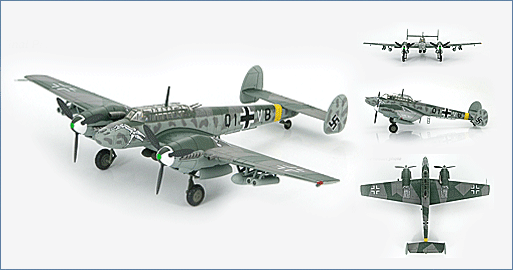Air Power Series>1:72 die-cast display model>BF 110>HA1807
BF 110G-2 Q1+VB, 12/SG 77, Russia, 1943

General Background
When used as a heavy-fighter-bomber the Bf-110 had mixed results. But when airborne radar was added along with nose-mounted armament and Schrage Musik (the upward firing cannons) the Bf-110 became a deadly nighttime predator for British bombers. By the end of 1942 Germany had almost 400 night-fighters of which 75% were Bf-110s. These deadly hunters managed to destroy almost 1300 aircraft during 1942 alone. As the British bomber attacks increased in size and frequency the Bf-110 was simply overwhelmed and couldn’t cope allowing more and more bombs to make it to German cities.
The Aircraft
The new Bf-110G-2 was first introduced to the war zone in January 1943 when it arrived in Russia. Over the course of 1943 278 Bf-110G-2s were sent to the Eastern Front. Within a month of arriving the aircraft were pressed into action when the Germans were driven out of Stalingrad. With the lack of Russian heavy bombers for the Bf-110 to tackle they were assigned to ground attacks in an effort to slow Russian tanks and troops advancing westward. By the end of 1943 all Bf-110s were withdrawn from Russia.
Specifications :
Powerplant: |
2 X Daimler Benz DB 605B 12 cylinder inverted-vee liquid-cooled engines rated @ 1,475 hp |
| (1,099 kw) @ 2,800 rpm for take-off and, 1,355 hp (1,010 kw) @ 2,800 rpm @ 18,700 ft. (5,699 m). | |
| Dimensions: | Wing Span - 53 ft. 4 7/8 in. (16.27 m) |
Length - 41 ft. 6 3/4 in. (12.67 m) |
|
Height - 13 ft. 1 1/4 in. (4.0 m) |
|
Weight Empty - 10,970 lb (4,975 kg) |
|
Maximum Loaded - 21,800 lb. (9,888 kg) |
|
| Performance: | Maximum Speed - 349 mph (562 kph) at 22,965 ft (7,000m) |
Range - 528 miles (850 km) at 304 mph (490kph) at 16,400 ft. (5,000m) |
|
|
Initial climb - to 5,500m (18,045 ft.) in 8 minutes |
| Service Ceiling - 32,800 ft. (10,000m) |

